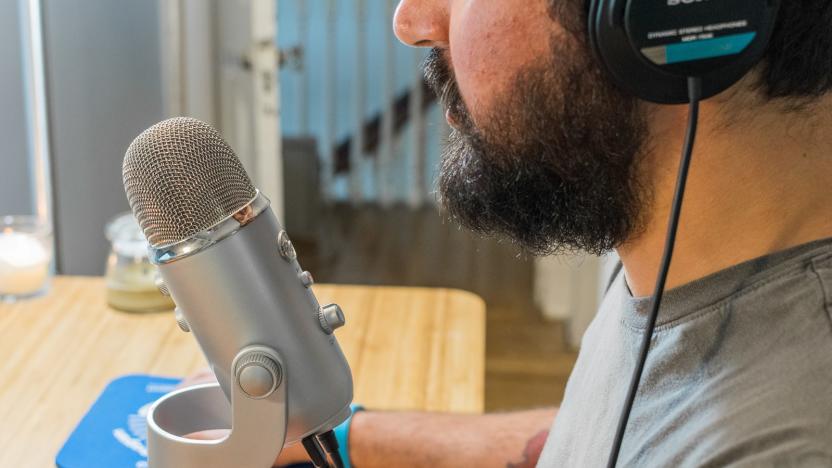shuremv5
Latest

The best USB microphone
By Kevin Purdy, Lauren Dragan This post was done in partnership with Wirecutter. When readers choose to buy Wirecutter's independently chosen editorial picks, Wirecutter and Engadget may earn affiliate commission. Read the full USB microphone guide here. After 75 hours of research, interviews, and making audio professionals and regular humans listen to the same phrases spoken into 25 different USB microphones, we remain convinced that the Yeti by Blue makes your voice sound the best with the least hassle. It makes a wider spectrum of voices sound better than the other microphones we tested, which tend to favor certain tones. Our pick since 2013, the Yeti is solidly built and easier to set up on your desk than most of the competition. It does best at capturing a single voice, but you can use it in a pinch for two-person sessions or even music recording. The mute, gain, and volume controls are easy to manipulate while recording. If you're an enthusiast, you might be able to get better results by putting time into a different, likely more expensive microphone, and more elaborate equipment (see our USB audio interfaces guide), but the Yeti puts the fewest hurdles between you and an ear-pleasing sound. The Yeti isn't everybody's pick for the best-sounding USB microphone, but that's par for the course when it comes to audio critiques. We sent samples of the same voice reading the same phrase into seven different microphones to four audio experts and five Wirecutter staffers. Four people rated the Yeti the best of all samples, though it was also ranked the worst of them by another. Giving the audio experts' opinions more weight, and considering the Yeti's features, build, and history of good reviews, it still came out on top. Perhaps the greatest downsides to the Yeti are its weight and tricky-to-assemble base; it's best for keeping near your computer, and it's not backpack-friendly. The Shure MV5 is the opposite. It weighs just over one pound fully assembled, its ball-shaped head can be unscrewed from its small base, and it can plug directly into an iPhone, iPad, or Android device. But what really makes the MV5 worth considering is its sound. When using the "voice" preset, its audio samples received a second-place ranking from all four experts (working blind to each other's results), and a tie for third place from Wirecutter staffers. If the Yeti is sold out or you want to spend a little less and save some room on your desk, the MV5 is a fine single-voice runner-up to the Yeti, although you'll have to figure out how to get it at your own personal speaking height. As you gain experience and learn what you like in a recording, you may want to fine-tune your setup. You may start recording with other people or with instruments and picking up gear like boom arms, shock mounts, and power conditioners. You will want to find the perfect mic (or mics) for your voice and whatever other instruments you want to record, and you'll want a USB audio interface to connect it to your computer.